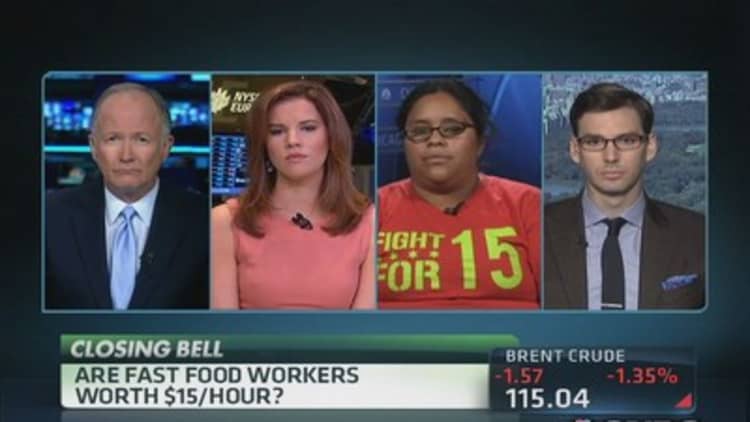Tuesday's off-year general elections include races for governor, mayor and state legislatures. But two special ballot initiatives to raise the minimum wage—part of a growing effort across the country to increase it—may be the most watched by businesses.
Voters in the small town of SeaTac, Wash., will decide if workers around the Seattle-Tacoma International Airport will have a minimum wage of $15 an hour. The state of Washington already has the highest minimum wage of any state at $9.19 per hour.
(Read more: Voters face wide range of ballot issues)
And voters in New Jersey will decide if their minimum wage should be $8.25 an hour, one dollar over the federal minimum wage. The measure would also include automatic annual adjustments for inflation, called "indexing."
States and cities cannot set a minimum wage lower than the federal standard—currently at $7.25 an hour— but they do have the power to raise it above the federal mark.
The $7.25 an hour wage translates into $15,080 for a full-time, year-round worker.
Some states—and the federal minimum wage law—allow employers to pay a lower minimum wage to workers who receive tips. That level is currently set at $2.13 an hour and has been there since 1991. Seasonal workers can also be paid below the federal or state minimum wage.
Five states—Alabama, Louisiana, Mississippi, South Carolina and Tennessee— have no state minimum wage laws but are required to pay the federal minimum.
Localized fights kick off

Efforts to increase the minimum wage are not new. Since 1998, 10 proposed increases have been on state ballots, and approved by voters each time. In his State of the Union speech last February, President Barack Obama called for increasing the federal minimum wage to $9 an hour.
Some 120 cities have enacted "living wages" that require businesses that receive city contracts to pay more than the federal minimum, ranging from $9 to $16 an hour.
But the spotlight on the minimum wage got brighter this summer with walkouts by fast-food workers in places like New York City, Chicago and Detroit. Workers called for a national minimum wage of $15 an hour.
In September, California Gov. Jerry Brown signed a bill to raise the state's minimum wage to $9 an hour from $8 by July 1. It will then jump to $10 an hour in 2016.
New York raised its minimum hourly rate to $8 this year with a target of $9 by 2015. Connecticut's minimum wage will go to $8.75 by Jan. 1 and increase to $9 by 2015.
And there seems to be public support for such action in other states.
A poll in April found that 76 percent of New Jersey voters favored the measure. Republican Gov. Chris Christie had vetoed a similar measure passed by the Democratic-led legislature last January.
(Read more: )
Christie, who is expected to be re-elected Tuesday, counter-offered with a dollar-an-hour bump phased in over three years. Christie also rejected the automatic yearly increases, which business groups opposed and which Christie said would "jeopardize the economic recovery we all seek."
State Democratic lawmakers rejected Christie's idea and approved putting the minimum wage issue on Tuesday's ballot.
Voters may decide wage issues
In the usual back and forth between supporters and opponents, advocates of the SeaTac raise and a raise in the federal minimum say it would support local economies and help thousands of workers that need the money.
Those include politicians like Democratic Sens. Elizabeth Warren of Massachusetts and Tom Harkin of Iowa, who have proposed legislation to raise the federal minimum to $9.80 by next year.
Costco executives as well as those at Starbucks have also called for a higher minimum wage of up to $10 an hour.
"Millions of the nation's lowest-paid workers are putting in long hours and working multiple jobs, yet are still struggling to afford basic expenses," said Christine Owens, executive director of the National Employment Law Project.
(Read more: Fed could be about to make a major policy change)
Those in opposition, like the National Federation of Independent Businesses, House Majority Leader John Boehner and McDonald's executives, say it would cost businesses too much money and cut down on hiring.
"Raising the minimum denies more low-skilled workers the opportunity to get a job and receive 'on the job' training," says the NFIB web site.
But the matter may ultimately be decided by voters in the elections to come.
Advocates in states like Alaska, Idaho, Massachusetts and South Dakota are pushing to put a higher minimum wage on ballots in 2014. And elected officials in Hawaii, Illinois, Maryland, Minnesota and the District of Columbia are ramping up efforts to pass minimum wage hikes.
—By CNBC's Mark Koba. Follow him on Twitter @MarkKobaCNBC.
.

